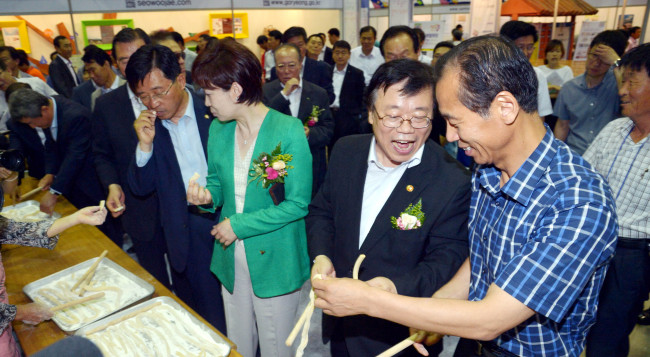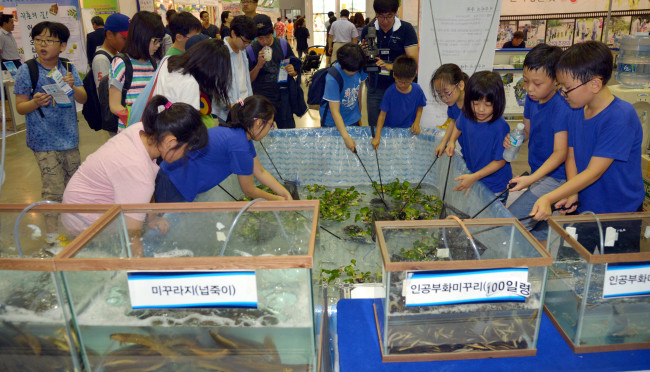 |
Agriculture Minister Lee Dong-phil (second from right) and Gangwon Gov. Choi Moon-soon (right) participate in the festival promoting tourism in rural and fishing villages that kicked off on Thursday at KINTEX in Goyang, Gyeonggi Province. (Kim Myung-sub/The Korea Herald) |
For those who look to countryside summer vacation spots for a break from their busy city life, the eighth festival for vacationing in rural and fishing villages this weekend will offer a chance to preview hundreds from around the nation.
During the event, which kicked off on Thursday at KINTEX in Goyang City, Gyeonggi Province, and will last until Sunday, about 300 rural or fishing villages from six provinces set up booths to highlight their village tour programs.
Some of them boast of pristine nature surrounding their village, while others lure visitors with unique traditional culture experience programs.
The Ministry of Agriculture, Food and Rural Affairs started organizing the festival in 2005 with the state-run Korea Rural Community Corp., as Korean villages, once isolated with the acceleration of urbanization, were regaining attention as tourist sites offering unique experiences. The festival has been held in exhibition halls in and out of Seoul to attract city visitors and thus to enhance urban-rural exchanges.
 |
Kids try catching mudfish during the rural festival at KINTEX in Goyang, Gyeonggi Province. (Kim Myung-sub/The Korea Herald) |
“The combination of the agricultural sector with the tourism industry has become a good example for a paradigm shift that traditional industries have to seek for their future growth,” Agriculture Minister Lee Dong-phil said in his opening remarks.
The policy is part of the government’s continued effort to tap the so-called “sixth industry” dimension of agriculture where farmers not only produce agricultural products but also process and market them, and engage in agro-tourism as well.
One of key sideline events on the opening day of the eighth festival was the pre-celebration of the first Urban-Rural Exchange Day. The government designated July 7 as the first Urban-Rural Exchange Day, following a partial amendment of the act on promoting urban-rural exchanges in May, which established legal ground to enhance continual exchange and communication between urban and rural areas, and so to seek balanced regional development.
‘Rural 20’ project for international exposure
For international visitors to the festival, “rural 20” villages are recommendable. Those villages are winners selected by the ministry-funded “rural 20” project. The project, which was launched in 2010, is aimed at exposing popular rural and fishing villages as tour destinations to the international community.
Under the project, the ministry selects 20 villages and develops tour courses for each under four themes ― nature, experience, tradition and well-being ― to show visitors a different taste of the Korean countryside.
Those courses offer information in various formats with four different languages ― Korean, Japanese, Chinese and English ― through the rural 20 website (www.rural20.kr).
For visitors who want to experience how to make Korean traditional liquor makgeolli, the website recommends Sansawon, a museum for traditional liquor and sweets, in Pocheon, Gyeonggi Province. Pocheon is famous for producing quality makgeolli.
Jeouri Village in Andong, North Gyeongsang Province, is recommended for those who are interested in learning about Korean traditional culture. The name “Jeouri” comes from “jeoul,” which means scale in Korean. The village’s topography resembles a scale. Along with neighboring Hahoe Village, designated as a World Cultural Heritage in 2010, Jeouri Village is intimately connected with the career and life of Ryu Seong-nyong, one of the most famous Confucian scholars of the Joseon era.
The satisfaction of foreign visitors is higher than expected, according to the Korea Rural Community Corp.
A survey of 1,665 foreign visitors who visited one of the rural 20 villages between September and December last year showed a 72 percent satisfaction level with their visit.
By Seo Jee-yeon (
jyseo@heraldcorp.com)









